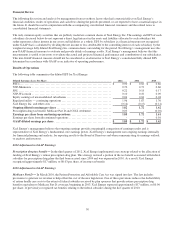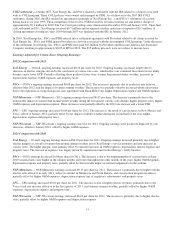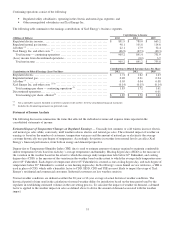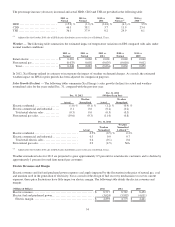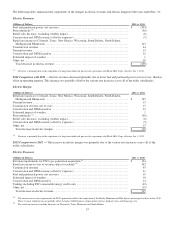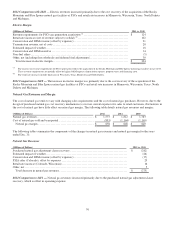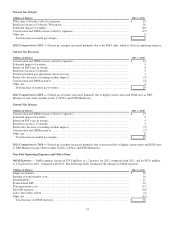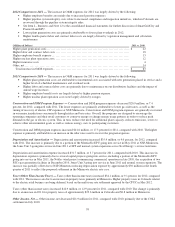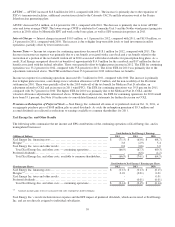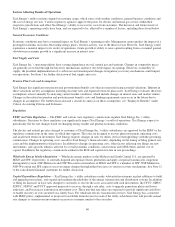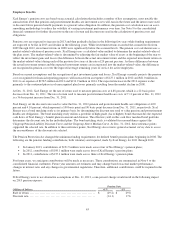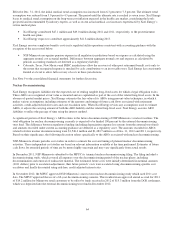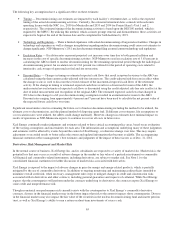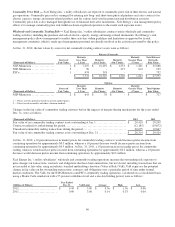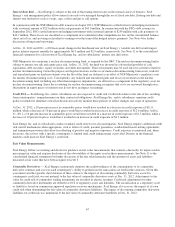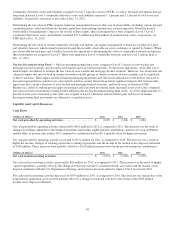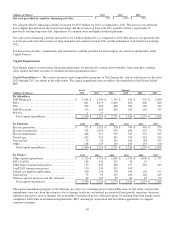Xcel Energy 2012 Annual Report Download - page 70
Download and view the complete annual report
Please find page 70 of the 2012 Xcel Energy annual report below. You can navigate through the pages in the report by either clicking on the pages listed below, or by using the keyword search tool below to find specific information within the annual report.60
Factors Affecting Results of Operations
Xcel Energy’s utility revenues depend on customer usage, which varies with weather conditions, general business conditions and
the cost of energy services. Various regulatory agencies approve the prices for electric and natural gas service within their
respective jurisdictions and affect Xcel Energy’s ability to recover its costs from customers. The historical and future trends of
Xcel Energy’s operating results have been, and are expected to be, affected by a number of factors, including those listed below.
General Economic Conditions
Economic conditions may have a material impact on Xcel Energy’s operating results. Management cannot predict the impact of a
prolonged economic recession, fluctuating energy prices, terrorist activity, war or the threat of war. However, Xcel Energy could
experience a material impact to its results of operations, future growth or ability to raise capital resulting from a sustained general
slowdown in economic growth or a significant increase in interest rates.
Fuel Supply and Costs
Xcel Energy Inc.’s operating utilities have varying dependence on coal, natural gas and uranium. Changes in commodity prices
are generally recovered through fuel recovery mechanisms and have very little impact on earnings. However, availability of
supply, the potential implementation of a carbon tax and unanticipated changes in regulatory recovery mechanisms could impact
our operations. See Item 1 for further discussion of fuel supply and costs.
Pension Plan Costs and Assumptions
Xcel Energy has significant net pension and postretirement benefit costs that are measured using actuarial valuations. Inherent in
these valuations are key assumptions including discount rates and expected return on plan assets. Xcel Energy evaluates these key
assumptions at least annually by analyzing current market conditions, which include changes in interest rates and market returns.
Changes in the related net pension and postretirement benefits costs and funding requirements may occur in the future due to
changes in assumptions. For further discussion and a sensitivity analysis on these assumptions, see “Employee Benefits” under
Critical Accounting Policies and Estimates.
Regulation
FERC and State Regulation — The FERC and various state regulatory commissions regulate Xcel Energy Inc.’s utility
subsidiaries. Decisions by these regulators can significantly impact Xcel Energy’s results of operations. Xcel Energy expects to
periodically file for rate changes based on changing energy market and general economic conditions.
The electric and natural gas rates charged to customers of Xcel Energy Inc.’s utility subsidiaries are approved by the FERC or the
regulatory commissions in the states in which they operate. The rates are designed to recover plant investment, operating costs
and an allowed return on investment. Xcel Energy requests changes in rates for utility services through filings with the governing
commissions. Changes in operating costs can affect Xcel Energy’s financial results, depending on the timing of filing general rate
cases and the implementation of final rates. In addition to changes in operating costs, other factors affecting rate filings are new
investments, sales growth, which is affected by overall economic conditions, conservation and DSM efforts and the cost of
capital. In addition, the regulatory commissions authorize the ROE and capital structure in rate proceedings.
Wholesale Energy Market Regulation — Wholesale energy markets in the Midwest and South Central U.S. are operated by
MISO and SPP, respectively, to centrally dispatch all regional electric generation and apply a regional transmission congestion
management system. NSP-Minnesota and NSP-Wisconsin are members of MISO and SPS is a member of SPP. NSP-Minnesota,
NSP-Wisconsin and SPS expect to recover energy charges through either base rates or various recovery mechanisms. See Note 12
to the consolidated financial statements for further discussion.
Capital Expenditure Regulation — Xcel Energy Inc.’s utility subsidiaries make substantial investments in plant additions to build
and upgrade power plants, and expand and maintain the reliability of the energy transmission and distribution systems. In addition
to filing for increases in base rates charged to customers to recover the costs associated with such investments, the CPUC, MPUC,
SDPUC, NDPSC and PUCT approved proposals to recover, through a rate rider, costs to upgrade generation plants and lower
emissions, and/or increase transmission investment cost. These non-fuel rate riders are expected to provide significant cash flows
to enable recovery of costs incurred on a timely basis. For wholesale electric transmission services, Xcel Energy has, consistent
with FERC policy, implemented or proposed to establish formula rates for each of the utility subsidiaries that will provide annual
rate changes as transmission investments increase in a manner similar to the rate riders.


